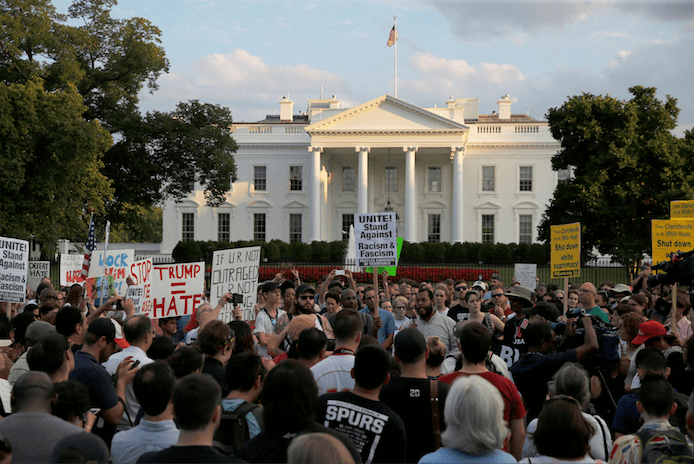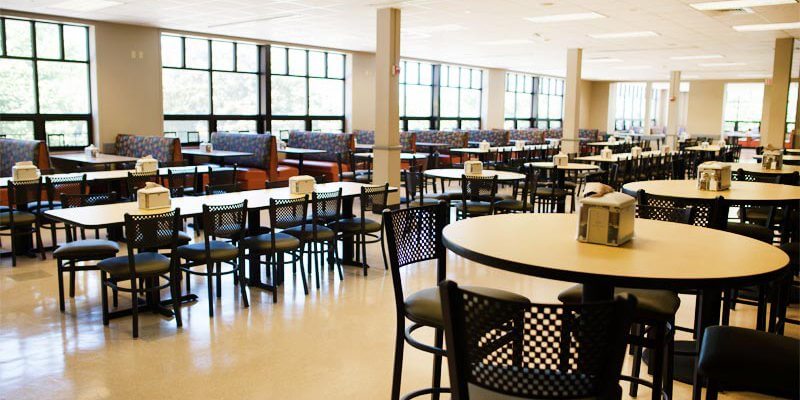Tag: Hannah Paxton ’19
Parents Are Dreamers Too: Changing the Conversation About Immigration
by The Cowl Editor on September 28, 2017
Politics

by Hannah Paxton ’19
Asst. Opinion Editor
Picture the student who sits next to you in the back of the classroom who you might not know very well. This student has a story to tell. This student had a gap in their resume until 2012, and then they worked at a food truck. They have not seen their grandmother for years because she lives in another country. They were granted a scholarship for half of their tuition, but are still at a loss as for how to pay tens of thousands of dollars.
This student is much like Javier Juarez, a recipient of Deferred Action for Childhood Arrivals and graduate of Brown University who spoke at the DACA Panel last Thursday, September 21. With the institution of DACA, Juarez was able to obtain a college education, but now that President Trump has rescinded the program, he may not be able to achieve his dream of attending Harvard Law School.
Many would agree that this is unfair, and that any young man or woman should have the opportunity to follow his or her dreams. They think it is the parents’ fault. They are the ones who should be blamed for illegally crossing the U.S. border. They are the ones who need to be punished, not their children.
But this is a dangerous thought, one that exhibits ignorance and impudence. To say that undocumented immigrants are committing a crime but that their children are faultless demonstrates an inconsistency in opinion. Children and parents alike come into the U.S. from various countries to find an improved life, so if kids do not deserve to be punished then why do their parents?
We say that these men and women are dreamers, striving for success in the U.S. However, once the parents are in the picture, they are deemed illegal felons. When this issue was posed to the panelists, Juarez said, “I’m here because of my parents. They are the original dreamers.”
In discussion and criticism, many do not understand the reality that undocumented immigrants face. Attorney Andrew Rogers told students at the panel that to “get in line the legal way” is to wait 29 years. For most families, 29 years is not nearly soon enough for them to seek new opportunities.
When we call undocumented immigrants criminals, what are we really condemning them for? Is it so wrong for them to want a better life, not just for themselves, but for their families as well?
Criminalizing parents is unjustified when they are the ones who brought these young dreamers to the U.S. in the first place. Since thousands of immigrants are now employed, up to 70,000 of the country’s jobs could be lost if they are deported.
These immigrants are people who are contributing to our society in ways we might not even realize.
They come from many walks of life and places around the world, but they are not so different from us. They are our peers, co-workers, friends, families. As President Obama once said, “They are Americans…in every single way except one—on paper.”
We The Cowl Staff
by The Cowl Editor on September 21, 2017
Opinion

by Sarah Kelley ’18 & Hannah Paxton ’19
Opinion Co-Editor & Asst. Opinion Editor
“The motto…of Providence College is Veritas, truth, and the College’s deepest mission is to teach its students to love and live in the truth,” said President of Providence College, Father Brian Shanley, O.P., in a message about the College’s mission statement. When over 1,000 copies of The Cowl were taken from the stands last Friday, this pursuit of the truth was directly and unrighteously violated.
While the whereabouts of the papers and the reason for their absence are still obscure, we do know that they were missing by Friday afternoon, less than 24 hours after they were distributed. The Department of Public Safety has been reviewing tapes, but no definitive suspect has been identified. The confiscation of The Cowl is subject to speculation, as anyone for any reason could have been responsible.
Regardless of who is accountable, to take away The Cowl is to limit the pursuit of truth of our campus and community. The Cowl is one of the largest, if not the largest, platform for PC students and their concerns to be heard. Everything that is published is written with the thought of the College’s mission of Veritas in mind. We strive to honestly inform students, professors, and faculty alike despite whatever differences in perspective there may be.
Freedom of speech is a constitutional right, one that should especially be upheld in a community that fosters the search for Veritas. Aside from divergence in opinion, The Cowl works tirelessly every week to have their voices and the truth be heard on behalf of their fellow students. No matter the motive behind this action, the fundamental right of expression has been disrespected.
Yet even with the significant support we have received from administration, from the Department of Public Safety, and from the faculty, the fact still remains that within the last few days, we have not received sufficient leads to close this case.
We cannot allow the numerous voices that our newspaper represents to be silenced through this violation of free speech. These are the voices of all those affected by the termination of the DACA program, the voices of those enlivened and outraged by our current presidential administration, and the voices of those students and faculty who believe an oversized flame may not be the best way for our college to be spending its money, just to name a few.
This oppressive action cannot deter The Cowl, let alone an institution of higher learning such as Providence College, from our pursuit of Veritas and from protecting our constitutional right to free speech. For these reasons, a greater, more timely, and consolidated response and plan of action is essential if we are to prioritize the values of truth and free speech that we hold as not only a college but also as a country founded on the belief in certain liberties, which of recent, have not been upheld.
The dead ends we encountered over the weekend regarding the investigation of the stolen newspaper is disappointing. This is an issue of campus and national significance that must be swiftly and properly addressed.
Tangents and Tirades
by The Cowl Editor on September 14, 2017
Opinion

What Did We Make Taylor Do?
It has been virtually impossible to avoid Taylor Swift’s music and personal drama for years and these past few weeks have been no exception. After being infamously targeted by Kim Kardashian West on Snapchat last July, Swift essentially disappeared from the spotlight.
Many wondered how she was going to break her silence to share her side of the story. Her first single, titled “Look What You Made Me Do,” was supposed to do just that. Swift’s new song appears to be her revenge plot against those she feels have damaged her reputation, but sounds more like a parody of songs about retaliation.
After listening to this song for the first time, I was left with questions that have yet to be answered. For example, the chorus makes no sense. Swift simply repeats the phrase “look what you made me do,” but what exactly did she do? Who is she talking to on the phone when she proclaims that “the old Taylor can’t come to the phone right now?” Why does that part of the song even exist?
Swift portraying herself as the victim who intends to exact revenge against her enemies is nothing new. She has been singing about getting back at boyfriends or friends who have wronged her since the beginning of her career.
“Look What You Made Me Do” is a predictable response to her recent portrayal in the media. Did anyone really think Swift was going to release a song called “Kanye and Kim were right, I was wrong?” Sadly, we will have to wait until November to find out if Swift is willing to provide us with any more details of her public feuds. Until then, we can only continue to speculate and wonder what exactly her enemies have made her do, just like she expects us to.
-Bridget Blain ’19
Package Pandemonium
Students walking up from the business school last Monday and heading for a quick lunch at Ray may have found themselves arrested by the sight of a rather copious gathering of humanity outside the mailroom. The line for package pickup stretched out the door, up the steps, and at some points, nearly breached the entrance to the mailbox area. The slow-moving line and the general sense of disorder caused by the influx of packages demonstrates that a new system for student pick-up of packages would save serious time and stress.
Some students, who arrived at peak hours to retrieve their packages, could have counted their wait times at around 45 minutes. Some of these same students waited only to be told that their packages were unable to be located by mailroom staffers. Such are the breaks when there is only one worker to find a package, swipe the student’s ID, and move on to the next customer in a seemingly unending line.
It would be rational for the mailroom to extend its hours during the high-volume periods at the beginning of the semester, when students are flocking to the Internet to order books and dorm room decorations. Perhaps a more rigid scheduling system that ensures student workers will show up would help make the experience of getting a package more endurable. Unless these or other changes are made, students should brace themselves for long delays to get their stuff.
-Kevin Copp ’18
Black Women Matter Too
“Nobody’s free until everybody’s free,” said Fannie Lou Hamer, an activist in the Civil Rights movement. She spoke these words at the Democratic National Convention in 1964, but 53 years later they still ring true.
While some citizens may insist that we have already achieved racial and gender equality as a nation, the fact remains that there is still much more progress to be made.
For decades—centuries even—black women have endured much to garner the same respect and attention to their fight for justice, a cause that is all too familiar to white women of privilege. For the most part, America recognizes women’s struggles. But the struggles black women face are immeasurably overlooked.
As Charlene Carruthers said at the Black Women and Girls Symposium, “We are fighting the same battle today as we were 10 years ago.” The push for justice for black women did not end with the Civil Rights movement, and it certainly will not end with the modern feminist movement.
We cannot talk about equal pay without talking about how black women are paid 63 cents for every dollar white men are paid. We cannot talk about women’s portrayal in the media without talking about the way in which black women are underrepresented.
Feminism that does not include black women is not feminism in its truest and most progressive form.
-Hannah Paxton ’19
The Power of Presidential Language
by The Cowl Editor on August 31, 2017
Opinion

by Hannah Paxton ’19
Asst. Opinion Editor
Language matters—especially that of the political leader of this country. Words have the power to build and destroy, to praise and condemn, to confront and evade.
With his comment about the statue removal protests in Charlottesville, Virginia, coming from “both sides,” President Trump’s jargon clearly represents the hateful power of words. Rather than taking an impactful stand against brutality and hate, he opted to diffuse the blame by way of generalization.
The president’s initial response on Twitter all but dodges the root of the problem when he puts the emphasis on “all” Americans, generalizing instead of calling the assailants by name. While this is a start, it does not pinpoint the perpetrators for their unspeakable hostility.
There is no question that the attack in Charlottesville calls for an advance toward unity and peace, but in order to do so, it is important to recognize and condemn those who are responsible. When President Trump retracted his denunciation of “neo-Nazis, white supremacists, and other hate groups” he pardoned the extreme acts of contempt in the name of racial antipathy.
Too often acts of racial hostility are overlooked for the sake of maintaining a sense of peace and pleasing the general population. However, this is harmful to the notions of liberty and equality that America strives to achieve.
What happened in Charlottesville was not an attack from “both sides,” but an attempted display of superiority by racial bigots, and to say otherwise is to perpetuate a problem that has been firmly rooted in the country’s soil from its beginning.
In the past, President Trump has proved that he pays careful attention to word choice when he criticized President Barack Obama for incorrect phrasing in reference to “Islamist extremism,” as he thought it distracted from the issue of eliminating the threat of terrorism. The same logic should then be applied to the violence in Charlottesville.
Distinguishing the perpetrator of the violence is the first step in taking a stand against racial bigotry. In doing so, we gain a better understanding and from there we can take action.
Trump was right to put a name to the brutality, but to then disperse the blame to all sides is to take a step backwards. The anti-racist protests were peaceful, merely countering the aggression of the opposing side.
These protestors were not the ones who plowed a speeding car into innocent bystanders, resulting in death and injury. Yet, according to the president’s comment, they are meant to share the fault.
Grouping anti-racist and anti-fascist activists with racial bigots is a vast overgeneralization that negates the deeply-grounded issue of racism in the United States. It sends the message that any kind of counterattack, however peaceful, is destructive.
Additionally, it deflects the focus from the root of the problem. It comes from a place of ignorance, and in this case, one person’s ignorance hinders an entire country’s education. If Charlottesville is deemed nothing more than angry demonstrations from both sides, then bigotry is victorious.
Ignorance breeds fear and fear breeds hatred; the same hatred that brought a group of white supremacists to Charlottesville.
Tangents and Tirades
by thecowl.opinion on April 27, 2017
Opinion

Marching For Facts
$2.6 billion. That’s $2.6 billion less dedicated to clean air, water quality, reducing emissions, and climate studies after President Trump cuts the budget of the Environmental Protection Agency (EPA). Billions of dollars taken away from the commitment not only to environmental care, but public health and safety as well. To ignore environmental concerns is to ignore the plain facts, and that’s why people marched for science last Saturday.
With the creation of the EPA, President Nixon once said that protecting the environment was “a cause beyond party and beyond factions,” and for good reason. So much of politics today is one viewpoint versus another, but all signs of science (otherwise known as facts) point to a climate that is under threat.
The fact that Trump plans to take money out of the budget suggests that scientific research has all been for nothing, that it holds no significance in our society. But this couldn’t be further from the truth. Scientific investigation has helped immensely in terms of dealing with the issue of climate change, to the point where 97 percent of experts agree that humans are responsible.
For those who might say that the March for Science won’t change any minds, that is not necessarily the point. Science matters. The facts matter. Taking care of the planet matters. Reducing the environmental budget is not going to change the fact that the conservation of the earth is of primary concern.
– Hannah Paxton ’19
Take Advantage of Spring Shows
A musical, a band concert, a dance club performance, an A cappella show—these are just a few of the artistic performances that have happened or will happen during these last few weeks of the semester. They are events that are sometimes simply passed over by students as just another blurb on that colorful card on the tables at Ray, but they are really a unique opportunity that college students should not miss out on.
We are in a rare position at Providence College, as are those in colleges around the country, in having many different kinds of entertainment just steps away and often at a reasonable price, if not completely free. And though we all have busy schedules, we should try our best to attend as many of these events as we can while we are here.
Professional singers, dancers, and performers all started somewhere, many of them on stages just like the ones in Smith. The student performers on campus will be these people someday too, and it will cost a lot more to see them once they leave.
I attended a performance of Into the Woods a few weeks ago and a student ticket was only $5. Where else but a college campus can you enjoy such quality entertainment for the price of a cup of coffee?
-Taylor Godfrey ’19
No Progress, Just Nuisance
Walking to my VW Beetle is usually a quick, pleasant trip, especially after I snag a coveted spot in the Glay Parking Lot. However, now when I walk to my car, I’m greeted by an ugly, inconvenient fence blocking off Huxley for a construction project with non-existent progress.
The fence, which stretches from the Cunningham lawn to the Glay Lot entrance, annoys anyone who walks down Eaton Street or parks his or her car. It turns my two minute walk into ten because it takes away one of the entrances to the lot and forces students to walk around. It’s a massive, literal roadblock in the middle of campus, ruining the spring aesthetic just in time for graduation.
Sure, the fence exists so that Huxley can become a walkway rather than a street, and construction is a messy affair. I would be willing to sacrifice beauty and convenience for a few months in the name of progress if actual progress were being made. However, the only thing that has changed in the fenced-in area during the last few weeks is the transformation of the Cunningham lawn into a mud pit.
If you’re going to start construction, please start construction. If you’re not going to start construction, please give me my walkway back. I’m just trying to get to the grocery store.
-Brianna Abbott ’17
Tangents and Tirades
by The Cowl Editor on April 6, 2017
Opinion

Going Nuts for PVDonuts
Although I am not a paid sponsor for any bakeries or doughnut shops, I would be doing a great disservice to Providence College and greater Rhode Island community if I did not bring to light the magic that is currently happening at 79 Ives Street, Wednesdays through Fridays, during the hours of 8 a.m.-3 p.m. at one incredible artisanal doughnut shop.
PVDonuts, Providence’s first specialty doughnut shop, is not only drawing attention from their local customers for their amazing doughnut creations, but has also gained widespread recognition from media outlets such as The Boston Globe, Buzzfeed, Daily Mail, Cosmopolitan, and Spoon University. If you have not tried their amazing doughnut creations yet, you are missing out on an amazing culinary experience unlike any doughnuts you have ever tried before.
With locally sourced ingredients, PVDonuts hand makes a wide variety of brioche yeasted donuts, traditional old-fashioned, and even vegan style doughnuts. PVDonuts is a true game changer for anyone looking for a sweet addition to their morning coffee. Their menu changes every month, so customers can expect a wide variety of imaginative flavors. From their ’90s-themed menu of March, including the “Dunkaroo” and “Oatmeal Cream Pie Donut” to their current April menu which includes, “The Elvis” and “Brown Butter Coffee Milk,” PVDonuts has established a sound reputation as a leader of the artisanal doughnut world that everyone should try.
-Sarah Kelley ’18
Lift the Laptop Ban
As we enter April, my notebook and folders are in tatters. Weeks of stuffing them into my packed backpack has shredded my notebook, and my folder is bursting at the seems with useless papers. Sifting through the mess is a nightmare, as important papers are impossible to find. Yet all of this could have been easily avoided! Everything I need could be in one convenient place: my laptop!
For someone as disorganized as myself, my laptop is essential. Everything can be neatly organized in virtual folders, and nothing can be forgotten or lost. Most importantly, I can write legible notes fast without worrying about my awful handwriting.
Yet every semester, a well-meaning professor bans laptops in their class. “Studies show on average they are not good for students,” they say, or “I think they’re distractions.” As noble as their intentions are, they are forgetting that people learn differently.
Everyone is different—it is impossible for studies to show what is good for everyone. Perhaps some find laptops distracting, but they are vital for others who are disorganized or have bad handwriting. Even if someone is irresponsible and spends class zoning out on ESPN, the rest of the class should not suffer for their mistakes. They should suffer the consequences, not others who are missing out on a crucial tool.
-Nicholas Moran ’19
Bring Back the Trees
One of the many great features of the Providence College campus is its vast stretches of greenery, but it is safe to say that the sudden lack of trees is probably not the vision most have in mind. The newfound stumps, particularly the one on Slavin Lawn, ,came as a surprise to many students. Not only has this abrupt change had a negative impact on the aesthetic of the campus, but more importantly on the environment.
When the weather is favorable, it is not uncommon to see students sitting under the shade of the trees, and it is easy to see why. On warm spring days trees are the perfect place to settle down and get homework done. The tree on Slavin Lawn was an especially popular spot for relaxing.
But these trees are more than just a means for students. Every tree that is cut down contributes to the increase in greenhouse gases reaching the atmosphere, leading to air pollution. Additionally, without trees, the soil becomes dry, losing its uniformity and its ability to produce food.
If not carefully done, replanting trees can also be harmful. Leftover sawdust can distort the ratio of carbon and nitrogen, and nitrogen is needed in order for a new tree to grow.
While there may not be an extensive diversity of species, trees are essential to the cultivation and protection of the environment of the campus.
– Hannah Paxton ’19
Ray-spect the Recommendations Board
by The Cowl Editor on March 23, 2017
Opinion

by Hannah Paxton ’19
Opinion Staff
The recommendation board in the Raymond Dining Hall is a great resource, but like everything else, it can easily be abused. Students have the freedom to write whatever they want on sticky notes, from food requests to dishes they particularly liked, but sadly, the board also gives them the freedom to be rude and unappreciative to a staff that works extremely hard every day of the week.
This week alone numerous harshly-worded complaints were left on the board, some of them even carrying a tone of snark, one of which read “Tostadas, really?” There were objections to mislabeled foods, criticisms about not having enough of something, and protests about the main dish of the night. While these accusations are not wrong in and of themselves, there is a better way to word what you are trying to say.
Being in college can sometimes change the way we react to certain situations once we grow accustomed to the way things operate. After all, the last time we were served three meals on a daily basis without any effort of our own was when we were infants. Once we were older we became used to having to make our own meals from time to time and taking care of the dishes ourselves. But that all changes in college.
When you want to eat, all you have to do is walk to the dining hall where so many options are presented to you that it can often be difficult to make up your mind. The only effort required of us is to pick up a plate and silverware and later put it on a conveyor when we’re done. After a while the setting becomes less foreign and more like second nature. Now we hardly think about the food we eat, we just have it served to us.
Meanwhile, the dining hall staff takes care of everything else. They are the ones who are up in the early hours of the morning to prepare all of our food for the day. They are the ones who pay special attention to the needs of the students, mindful of allergies and maintaining variety from day to day. They are the ones who listen and respond to the requests we stick on that board.
It is easy to forget how fortunate we are that there is an entire group of people that works hard to make sure we are fed, but that does not mean that we should. While criticism is important and beneficial no matter the situation, it should be directed in a manner that keeps in mind the people to whom it is addressed.
The fact that we even have a board to write recommendations on is a privilege in itself, because it means that they truly care about what we as students want. If there is ever the need for criticism, just keep in mind that it’s a person to whom you are writing to and that your notes are actually seen and taken into consideration. A little bit of gratitude goes a long way.
Anti-Semitism In America
by The Cowl Editor on March 2, 2017
Opinion

By Hannah Paxton ’19
Opinion Staff
While most would like to believe that prejudice towards the Jewish community is a thing of the past, the damaged and disintegrated gravestones in a historic Jewish cemetery in St. Louis, Missouri send a different mesaage. Over 170 graves were vandalized at the 124 year old cemetery on the weekend of Feb. 18, with no suspects and no motives besides hatred.
Although other forms of issues may appear more dominant in our national discourse, such as other forms of racism, misogyny, and poverty, the recent violence and discrimination targeted towards this Jewish community demands major national attention. Jews deserve the same attention we pay to other suppressed groups of people, and certainly deserve the same respect in death.
While the events of the Holocaust have long since passed, that does not mean the controversies and mindsets that catalyzed such a devastating occurrence disappeared with it. Hatred for Jewish people is as real as the crumbled and toppled stones in the St. Louis cemetery.
The hatred that fueled mass murder of an entire people is the same hatred that motivated someone to deface a tombstone.
This contemptuous incident brought many to the cemetery, fearing their loved one’s grave was affected, anticipating that their Jewish identity had something to do with such disrespect. Regardless of the perpetrator’s motives, something so contemptible can only come from a place of hostility and prejudice. The people buried beneath those gravestones may be dead, but their memory has been greatly dishonored and their families are left deeply offended.
It is horrible enough to consider what took place in St. Louis, but the contempt for Jews in 2017 does not end there. Bomb threats were made to Jewish Community Centers all over the country on the same day that the report came of the vandalism of the cemetery.
And on Saturday, February 25, a second Jewish cemetery was vandalized in Philadelphia. Seventy-five to 100 gravestones were overturned, making it the second instance of targeting a Jewish cemetery in less than a week.Each of these issues were largely ignored yet are just as impactful as any other circumstance of racial prejudice.
With all of this in mind, it is hard to argue that anti-Semitism is predominantly an irrelevant issue in our time.
While no person was physically harmed in either of these events, it is the mentality behind incidents like this that is most distressing. For whatever reason, there are people in this country who think it is acceptable to act on their contempt for others, but the hate and violence that these extremists promote can not be tolerated in our nation. Whether they respond out of fear, hatred, ignorance, or perhaps all three, these are the people who are dragging the country backwards. Rather than moving forward with compassion and respect for people of all backgrounds and beliefs, they insist on clinging to the damaging mentality of the past, and it is daunting to imagine what could become of this horrible and unacceptable behavior.
A Country of Care
by The Cowl Editor on February 9, 2017
Opinion

by Hannah Paxton ’19
In a time of so much political controversy and antagonism, it is no surprise that a vast amount of protests are taking place all across the country for a variety of causes. Whether it be for women, immigrants, or refugees, people nationwide find reason for disappointment, and put that adversity into action.
However, even with a large portion of the country in protest, there are many people who seem to believe these demonstrations come from a place of immaturity and oversensitivity. They fail to acknowledge the purpose of such a public manner of objection, when truthfully it isn’t too difficult to understand.
When it comes down to it, protest is really about the love of your country, or more specifically, love of the people in your country. On the surface, it’s easy to think that people who are marching in the streets with signs and flags are filled with hate —and that may be the case for some —but the fact is, at its very root, protest comes from a place of love.
And that love is manifested in taking action against something one might think is unjust, in the hopes of bringing about some sort of change. People are so quick to judge those who walk in solidarity, many of whom are young adults that get labeled as hypersensitive and childish, as though they are children throwing a fit for not getting their way. But the truth is that young people are probably the most important when it comes to standing up against an unjustified cause.
We are the future. The power to make change is in the hands of our generation. No matter what anyone else says, we are the ones who are most capable of making visible and significant progress.
Too often when people are upset about political events, they will do no more than complain to anyone around them about injustice, and declare that a change needs to be made, but ultimately do nothing about it.
They will sit in discontent, but it isn’t enough to mobilize their anger. Call us immature and petulant, but our generation knows what it is doing when we recognize inequality and publicly fight against it. It might take a lot of time and effort, but we know that nothing in the world is ever going to change if we don’t take that first step to change it ourselves.
People of all ages, backgrounds, and ethnicities join together to protest, and that is what makes it so meaningful. In this one action, people from all different walks of life are standing together in unity to stand up for justice and equality, and if that isn’t showing awareness and maturity, then nothing else is.
So, while from the sides of the street, or on the couch in front of the TV, it may seem inconsequential or a waste of time, these are people who care enough about our country and the people who live in it to express their frustration in a way that is not only peaceful, but also adequate for making change happen.
Major Decisions
by The Cowl Editor on January 26, 2017
Opinion

by Hannah Paxton ’19
Opinion Staff
College is the time where you make what is arguably the most important choice in your life: what you are going to major and / or minor in. It makes sense; the major you choose now determines the path you take from the moment you graduate school. That’s why it’s so important to choose something you actually love, not what you think you should love.
There is constant pressure placed on college students to pick a major that suits your career aspirations, a major that will provide you with a sense of security. But it would seem as though this idea of career aspirations is lost on us. We forget about working towards a job that we want and focus instead on the concept of “job” alone.
We are afraid, and rightfully so. The world of adulthood can be a scary place, even just to think about. We don’t want to transition from the realm of late night studying and early morning classes, as difficult as it is, to some place completely different, where we don’t have the luxury of excusing ourselves as children. That alone is reason enough for anyone to be worried about the decisions they make concerning their future.
But it doesn’t have to be that way. True, money is important, but your happiness is even more so. It’s easy to declare a finance major or a business studies minor with the justification that it will guarantee you a good job with a high salary after college, but when doing so ask yourself, money and security aside, do you really want this?
If the answer is yes then I think it’s safe to say that you found yourself the perfect major. If the answer is no then it’s time to reevaluate. Maybe courses like economics and biology don’t come easy to you, while history or Spanish do, and that’s okay. Maybe it’s true that some majors will guarantee you higher earnings than others, but that doesn’t mean that it’s a good enough reason to pursue it.
Say that you are someone more inclined to the humanities, but you opt for majoring in computer science and after graduating you get a job where you make a lot of money. If coding for hours upon hours a day doesn’t make you happy then it won’t be worth it. You might have more money, but you wouldn’t be as content as you would be if you were a teacher or a psychologist.
Wouldn’t it be better to have a job that you know you’ll be happy with for years and years to come as opposed to a job that you’re barely interested in and will want to end up quitting after a few months, even if that?
As cliché as it may sound, money most definitely will not buy you happiness. It might satisfy you temporarily, but in the long run it just isn’t possible, unless that money is coming from putting effort into something you enjoy. Finding a major that’s best for you is just the first step.
